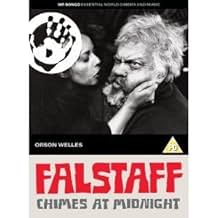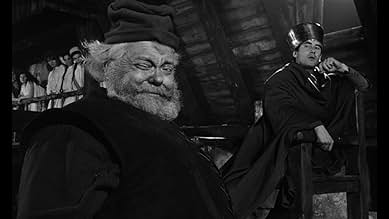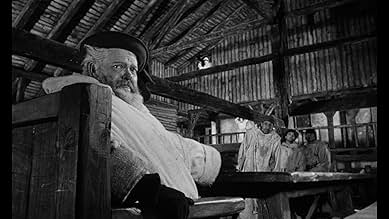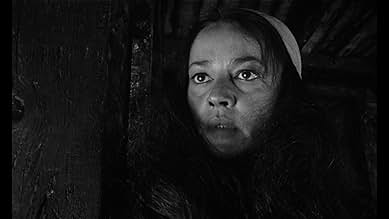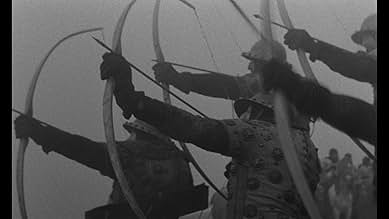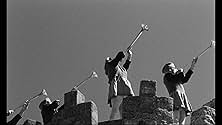CALIFICACIÓN DE IMDb
7.6/10
11 k
TU CALIFICACIÓN
La carrera del personaje Sir John Falstaff de Shakespeare, como compañero del joven príncipe Hal, desde 1400 a 1413.La carrera del personaje Sir John Falstaff de Shakespeare, como compañero del joven príncipe Hal, desde 1400 a 1413.La carrera del personaje Sir John Falstaff de Shakespeare, como compañero del joven príncipe Hal, desde 1400 a 1413.
- Dirección
- Guionistas
- Elenco
- Nominada a1 premio BAFTA
- 3 premios ganados y 2 nominaciones en total
Michael Aldridge
- Pistol
- (as Michael Aldrich)
Andrés Mejuto
- Woman's Tailor
- (as Andres Mejuto)
José Nieto
- Northumberland
- (as Jose Nieto)
- Dirección
- Guionistas
- Todo el elenco y el equipo
- Producción, taquilla y más en IMDbPro
Opiniones destacadas
10ednlaura
This is one of the great Shakespearean adaptations and a true 'lost classic'. It's also the last masterpiece that Orson Welles directed in his lifetime, and with 'Citizen Kane,' 'Magnificent Ambersons' and 'Touch of Evil' comprises a quartet of major cinematic works that he accomplished.
The film is an inventive re-editing and condensation of Shakespeare's plays, spanning from the end of Richard II to the beginning of Henry V. The film focuses on the character of Jack Falstaff, played by Welles himself in a virtuoso performance. Falstaff's relationship with young Prince Hal (later Henry V) is explored, and uncannily parallels Welles' own experience with the young talents of Hollywood.
Chimes at Midnight can be a jarring experience due to inconsistent film quality, low budget sets and Welles' flair for shock cuts, but it's a truly rewarding experience once you adapt to the style and limitations.
There are several great performances, by John Gielgud as Henry IV, Keith Baxter as Hal and Norman Rodway as Hotspur, who seems like a predecessor to Kenneth Branagh.
Chimes at Midnight has a little of everything: low comedy, highly artistic camera angles, exciting battle scenes (the battle of Shrewesbury scene influenced Braveheart) and a deeply moving story that Welles has 'discovered' between the lines of Shakespeare's histories.
The film is an inventive re-editing and condensation of Shakespeare's plays, spanning from the end of Richard II to the beginning of Henry V. The film focuses on the character of Jack Falstaff, played by Welles himself in a virtuoso performance. Falstaff's relationship with young Prince Hal (later Henry V) is explored, and uncannily parallels Welles' own experience with the young talents of Hollywood.
Chimes at Midnight can be a jarring experience due to inconsistent film quality, low budget sets and Welles' flair for shock cuts, but it's a truly rewarding experience once you adapt to the style and limitations.
There are several great performances, by John Gielgud as Henry IV, Keith Baxter as Hal and Norman Rodway as Hotspur, who seems like a predecessor to Kenneth Branagh.
Chimes at Midnight has a little of everything: low comedy, highly artistic camera angles, exciting battle scenes (the battle of Shrewesbury scene influenced Braveheart) and a deeply moving story that Welles has 'discovered' between the lines of Shakespeare's histories.
Shakespeare Scholars are always complaining how this film used and abused Shakespeare's plays but I think what was done in this film was pretty clever: Take the character of Falstaff from several plays and piece them together to get a complete picture of the man.
Of the two Orson Welles Shakespeare films I've seen, this one and "Othello" (1954), both had the ability to make me want to read Shakespeare's plays and any film that makes you want to read what the author wrote is a very positive thing to say about a film. So there Shakespeare Scholars!
I did go out and buy the books with the plays used in this film, much like trying to solve a puzzle to see how the pieces really fit. And Orson did twist and bend things a little to make it come out his way.
I also read in Videohound's "World Cinema" (1999) by Elliot Wilhelm that this film may be getting a restoration. If it's as good a restoration as "Othello", I'm looking forward to it!
Welles as Falstaff really shines in this film and Falstaff's later rejection by Henry V is one of the most sobering in cinema. And Welles still has some very creative power left in him by 1965, look at the Battle of Shrewsbury scenes. When it comes to battle scenes they've been done probably only 10 different ways by 1000 directors in a 1000 movies over the years, but this one is probably the most memorable. It's also strange to have in the heat of battle Falstaff looking like a big metal beach ball running around back and forth trying to avoid any conflict.
This film is also a good example of good music and how to use it in a film and it's another one of my favorite movies about Merrie ol' England.
Of the two Orson Welles Shakespeare films I've seen, this one and "Othello" (1954), both had the ability to make me want to read Shakespeare's plays and any film that makes you want to read what the author wrote is a very positive thing to say about a film. So there Shakespeare Scholars!
I did go out and buy the books with the plays used in this film, much like trying to solve a puzzle to see how the pieces really fit. And Orson did twist and bend things a little to make it come out his way.
I also read in Videohound's "World Cinema" (1999) by Elliot Wilhelm that this film may be getting a restoration. If it's as good a restoration as "Othello", I'm looking forward to it!
Welles as Falstaff really shines in this film and Falstaff's later rejection by Henry V is one of the most sobering in cinema. And Welles still has some very creative power left in him by 1965, look at the Battle of Shrewsbury scenes. When it comes to battle scenes they've been done probably only 10 different ways by 1000 directors in a 1000 movies over the years, but this one is probably the most memorable. It's also strange to have in the heat of battle Falstaff looking like a big metal beach ball running around back and forth trying to avoid any conflict.
This film is also a good example of good music and how to use it in a film and it's another one of my favorite movies about Merrie ol' England.
Up front I think it's fair to admit that I have not read the plays Shakespeare wrote that provide the basis of this film and it's screenplay.
I've read Romeo and Juliet, Macbeth and Julius Ceaser and I'm blessed that my public education provided me that much. But when it comes to Henry the IV, V, or VI I'm pretty much in the dark.
Chimes of Midnight did not leave me in the dark however. Orson Welles, I think, did a wonderful job of translating Shakespeaian dialogue into action that could be understood, jokes that could be understood, dramatic tension that could be understood.
Not only do i realize I am 400 years removed from Shakespeare but I am also 53 years removed from whatever audience Orson Welles intended this for in in 1965.
But I don't feel removed from the artistry that it took to make this film.
I could follow the plot, I knew where characters were emotionally, and even better, I understood the jokes. Which, for me, was a huge windfall and a source of amazement.
Orson Welles was dead before I was even born and I find him totally captivating and engaging in this film. He's lovable, he's a rapscallion, he's larger than life and he breaks your heart when he's denied by the newly crowned king.
I'm coming to this as an outsider. I loved Citizen Kane and Touch of Evil, I immensely enjoyed F is for Fake, and I've been looking to engage in more films starring or directed by Orson Welles, and I walked away from this film feeling like it filled a gap.
Here was his passion for gorgeous cinematography, here was his love of the stage, here was his brilliance at translating plays, here was his love for acting here was his passion for entertainment.
At no point did this film drag for me, and even now, in 2017 did the battle scene not only engage, but surprise me. This IS masterclass film making and this film deserved a wider audience back in 1965 and it deserves it still today.
Absolutely riveting and amazing work.
I've read Romeo and Juliet, Macbeth and Julius Ceaser and I'm blessed that my public education provided me that much. But when it comes to Henry the IV, V, or VI I'm pretty much in the dark.
Chimes of Midnight did not leave me in the dark however. Orson Welles, I think, did a wonderful job of translating Shakespeaian dialogue into action that could be understood, jokes that could be understood, dramatic tension that could be understood.
Not only do i realize I am 400 years removed from Shakespeare but I am also 53 years removed from whatever audience Orson Welles intended this for in in 1965.
But I don't feel removed from the artistry that it took to make this film.
I could follow the plot, I knew where characters were emotionally, and even better, I understood the jokes. Which, for me, was a huge windfall and a source of amazement.
Orson Welles was dead before I was even born and I find him totally captivating and engaging in this film. He's lovable, he's a rapscallion, he's larger than life and he breaks your heart when he's denied by the newly crowned king.
I'm coming to this as an outsider. I loved Citizen Kane and Touch of Evil, I immensely enjoyed F is for Fake, and I've been looking to engage in more films starring or directed by Orson Welles, and I walked away from this film feeling like it filled a gap.
Here was his passion for gorgeous cinematography, here was his love of the stage, here was his brilliance at translating plays, here was his love for acting here was his passion for entertainment.
At no point did this film drag for me, and even now, in 2017 did the battle scene not only engage, but surprise me. This IS masterclass film making and this film deserved a wider audience back in 1965 and it deserves it still today.
Absolutely riveting and amazing work.
I won't belabor the point that you can gather from reading 40+ other reviews, so I will offer a few short words on the theme of the movie, as well as caveat, for watching Orson Welles' Chimes at Midnight.
The film overall deals with that time-honored notion noted by St. Paul "When I was a child, I used to talk like a child, and see things as a child does, and think like a child; but now that I have become an adult, I have finished with all childish ways." Prince Hal is growing up and becoming an adult, and as such must soon leave his childish pranks and habits behind. His friend, Falstaff, is that childhood friend (paradoxically old in age, as if he never grew up himself). Boisterous, drunk, and a glutton, the blowhard gleefully recounts all the good times that he, Prince Hal, and their other misfits used to have, doing the things that children and adolescents do, like being a nuisance, harassing others, and goofing off. It is the type of life Falstaff still leads and he is quite happy with it. Prince Hal is, too, until the weight of responsibility is slowly thrust upon him thanks to his sick father. As the stakes are raised, he slowly loses the time and desire to be a silly young boy and now must be a man.
Falstaff is oblivious to this development all the way until the end, thinking that these are just momentary phases before the parties can begin anew. He is ever hopeful that the Prince and the world will see things his way. He fails to see how the world moves past a fat, blundering fool. His love for the prince, for the girls of the bawdy bar, for his compatriots is, while sometimes humorous and self-serving, he nonetheless wishes no real ill on anyone and merely lives for fun and pleasure. In his old age, he has decided that being an adult (if he ever was one) is not something worth putting time and energy in to. He is unimportant and carefree enough to have that luxury; however, his closest friends cannot shirk away from their duties as men, and thus Falstaff fails to realize how he is left behind.
All of this is turned into a moving portrait. We realize that Falstaff is wrong, and that sometimes the world calls for more than just joking around, goofing off and indulging one's self. But we sympathize with him, because we can see a gentle and loving person underneath the bluster and idiocy - and perhaps we ourselves wish the world were more "childish" and carefree. At the climactic battle scene (were Welles' camera work makes a hundred men or less look like a thousand), men grind and pulverize each other into hamburger meat - but Falstaff never manages to hurt a single soul. Perhaps there is some good in being childish!
For those wishing to watch the movie, the Criterion package is an excellent one. The customary supplemental materials are fascinating, and the picture brings out Welles' cinematography. Criterion and co. did there best with the sound, and the sound is the biggest single issue with which you will struggle with (or at least I did) with Chimes. Even with work done on it, the sound levels are inconsistent, especially with actors' lines. Sometimes whole scenes will go by with what sounds like dubbers mumbling their lines, straining your ears and making you crank the volume up on your TV. Then all of the sudden someone will speak loudly and clearly, blowing you back with the force of it and making you quickly turn the volume back down... only for the process to repeat again. I have not done this yet, but I would probably recommend watching with subtitles on to help alleviate the issue of figuring out what some of the whispers and mumbles are supposed to be. Not an elegant solution, but with Welles' later work, you will have to deal with some technical issue or another.
Don't let the above turn you off from seeing this beautiful, and moving film. It is a worthy adaptation and remix of Shakespeare and one of Welles' greatest movies.
The film overall deals with that time-honored notion noted by St. Paul "When I was a child, I used to talk like a child, and see things as a child does, and think like a child; but now that I have become an adult, I have finished with all childish ways." Prince Hal is growing up and becoming an adult, and as such must soon leave his childish pranks and habits behind. His friend, Falstaff, is that childhood friend (paradoxically old in age, as if he never grew up himself). Boisterous, drunk, and a glutton, the blowhard gleefully recounts all the good times that he, Prince Hal, and their other misfits used to have, doing the things that children and adolescents do, like being a nuisance, harassing others, and goofing off. It is the type of life Falstaff still leads and he is quite happy with it. Prince Hal is, too, until the weight of responsibility is slowly thrust upon him thanks to his sick father. As the stakes are raised, he slowly loses the time and desire to be a silly young boy and now must be a man.
Falstaff is oblivious to this development all the way until the end, thinking that these are just momentary phases before the parties can begin anew. He is ever hopeful that the Prince and the world will see things his way. He fails to see how the world moves past a fat, blundering fool. His love for the prince, for the girls of the bawdy bar, for his compatriots is, while sometimes humorous and self-serving, he nonetheless wishes no real ill on anyone and merely lives for fun and pleasure. In his old age, he has decided that being an adult (if he ever was one) is not something worth putting time and energy in to. He is unimportant and carefree enough to have that luxury; however, his closest friends cannot shirk away from their duties as men, and thus Falstaff fails to realize how he is left behind.
All of this is turned into a moving portrait. We realize that Falstaff is wrong, and that sometimes the world calls for more than just joking around, goofing off and indulging one's self. But we sympathize with him, because we can see a gentle and loving person underneath the bluster and idiocy - and perhaps we ourselves wish the world were more "childish" and carefree. At the climactic battle scene (were Welles' camera work makes a hundred men or less look like a thousand), men grind and pulverize each other into hamburger meat - but Falstaff never manages to hurt a single soul. Perhaps there is some good in being childish!
For those wishing to watch the movie, the Criterion package is an excellent one. The customary supplemental materials are fascinating, and the picture brings out Welles' cinematography. Criterion and co. did there best with the sound, and the sound is the biggest single issue with which you will struggle with (or at least I did) with Chimes. Even with work done on it, the sound levels are inconsistent, especially with actors' lines. Sometimes whole scenes will go by with what sounds like dubbers mumbling their lines, straining your ears and making you crank the volume up on your TV. Then all of the sudden someone will speak loudly and clearly, blowing you back with the force of it and making you quickly turn the volume back down... only for the process to repeat again. I have not done this yet, but I would probably recommend watching with subtitles on to help alleviate the issue of figuring out what some of the whispers and mumbles are supposed to be. Not an elegant solution, but with Welles' later work, you will have to deal with some technical issue or another.
Don't let the above turn you off from seeing this beautiful, and moving film. It is a worthy adaptation and remix of Shakespeare and one of Welles' greatest movies.
(Flash Review)
Very rarely has a voice been so perfectly matched to the poetic genre of Shakespeare. His deep and rich voice bellows out lines with great authority and emotion. I have a strong dislike for Shakespeare as I've never been able to fully comprehend the dialog. But this was an Orson film so I gave it my time and was rewarded by well-composed shot framing and interesting camera angles as well as his distinctive voice. The plot was about the betrayal of friendship and revolves around kings and people ascending to power while some get left behind. Great acting, a meaty story and if you like both Shakespeare and Orson Welles, don't miss it.
Very rarely has a voice been so perfectly matched to the poetic genre of Shakespeare. His deep and rich voice bellows out lines with great authority and emotion. I have a strong dislike for Shakespeare as I've never been able to fully comprehend the dialog. But this was an Orson film so I gave it my time and was rewarded by well-composed shot framing and interesting camera angles as well as his distinctive voice. The plot was about the betrayal of friendship and revolves around kings and people ascending to power while some get left behind. Great acting, a meaty story and if you like both Shakespeare and Orson Welles, don't miss it.
¿Sabías que…?
- TriviaDespite portraying Falstaff as a grossly obese man, Orson Welles actually had to diet to slim down for the role.
- ErroresThe corpse of Hotspur opens and closes his mouth several minutes after his death.
- ConexionesFeatured in The 43rd Annual Academy Awards (1971)
Selecciones populares
Inicia sesión para calificar y agrega a la lista de videos para obtener recomendaciones personalizadas
- How long is Chimes at Midnight?Con tecnología de Alexa
Detalles
- Fecha de lanzamiento
- Países de origen
- Idioma
- También se conoce como
- Campanadas de medianoche
- Locaciones de filmación
- Calatañazor, Soria, Castilla y León, España(London streets scenes)
- Productoras
- Ver más créditos de la compañía en IMDbPro
Taquilla
- Presupuesto
- USD 800,000 (estimado)
- Total en EE. UU. y Canadá
- USD 126,724
- Fin de semana de estreno en EE. UU. y Canadá
- USD 13,630
- 3 ene 2016
- Total a nivel mundial
- USD 126,724
- Tiempo de ejecución1 hora 59 minutos
- Color
- Mezcla de sonido
- Relación de aspecto
- 1.66 : 1
Contribuir a esta página
Sugiere una edición o agrega el contenido que falta

Principales brechas de datos
By what name was Campanadas a medianoche (1965) officially released in India in English?
Responda


